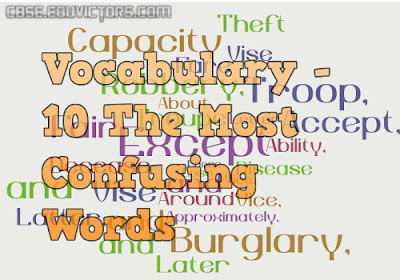Vocabulary - 10 The Most Confusing Words
① Ability, Capacity
Ability refers to the power to do something.
e.g. Citrus foods are said to have the ability to prevent colds.
Capacity refers to the ability to hold or contain something.
e,g. This hall has a capacity of 5,000 seats.
② About, Approximately, Around
About refers to a rough estimate. Commonly used in face to face speech.
e.g. We waited about 30 minutes for the bus.
Approximately refers to near accuracy.
e.g. This school enrolls approximately 4,000 students.
Around refers to a physical proximity or surrounding.
e.g. We’ll look for you around the front of the building.
③ Accept, Except
Accept means to admit, receive, or agree.
e.g. We accept your invitation to the ceremonies.
Except as a preposition means other than.
e.g. The student’s grades are low in every subject except science.
④ Burglary, Robbery, Theft
Burglary means breaking into a building to steal something.
e.g. Burglaries are quite common in this sector because of poor patrolling.
Robbery is the taking of one’s property by threat or force.
e.g. Police found 10 people are involved in this bank robbery.
Theft is the taking of one’s property without threat or force.
e.g. Identity theft is a fast growing cyber crime.
⑤ Disease and Decease
Disease refers to illness.
e.g. He is suffering from a chronic disease.
Decease is a noun, which means “death
e.g. The child was rendered helpless on the decease of his parents.
⑥ Latter, Later and Letter
Latter refers to the second of two persons or things mentioned previously.
e.g. The shopkeeper showed a red sari and a pink sari, I preferred the latter.
Use later when referring to time.
e.g. She came later than Meena for the party.
Letter means a written, typed, or printed communication, sent in an envelope.
e.g. It has been a month since I received a letter from my aunt.
⑦ Fair and Fare
Fair means free from favoritism or self-interest. or conforming with established standards or rules
e.g. We expect the Judge to be fair in his judgement.
The bride is of fair complexion.
Fare means the sum (amount) charged for riding in a public conveyance
e.g. The railway fares have gone up with effect from 1st of April.
⑧ Troop, Troupe
Troop is a group of people or animals.
e.g. A troop of new students is visiting our factory this week.
Troupe is a company of actors or performers.
e.g. The College Drama Troupe was started in 1995.
⑨ Loose and Lose
Loose is an adjective meaning not tight, not dense.
e.g. The animals broke loose and left the field.
Lose means fail to keep or misplace, fail to make money in a business:
e.g. He often loses his temper.
⑩ Vice, Vise
Vice refers to a bad habit or wickedness.
e.g. His only vices are coffee and loud music.
Vise is the clamp used in carpentry or metal work.
e.g. To change the grip, clamp the golf club in a vise.

No comments:
Post a Comment
We love to hear your thoughts about this post!
Note: only a member of this blog may post a comment.